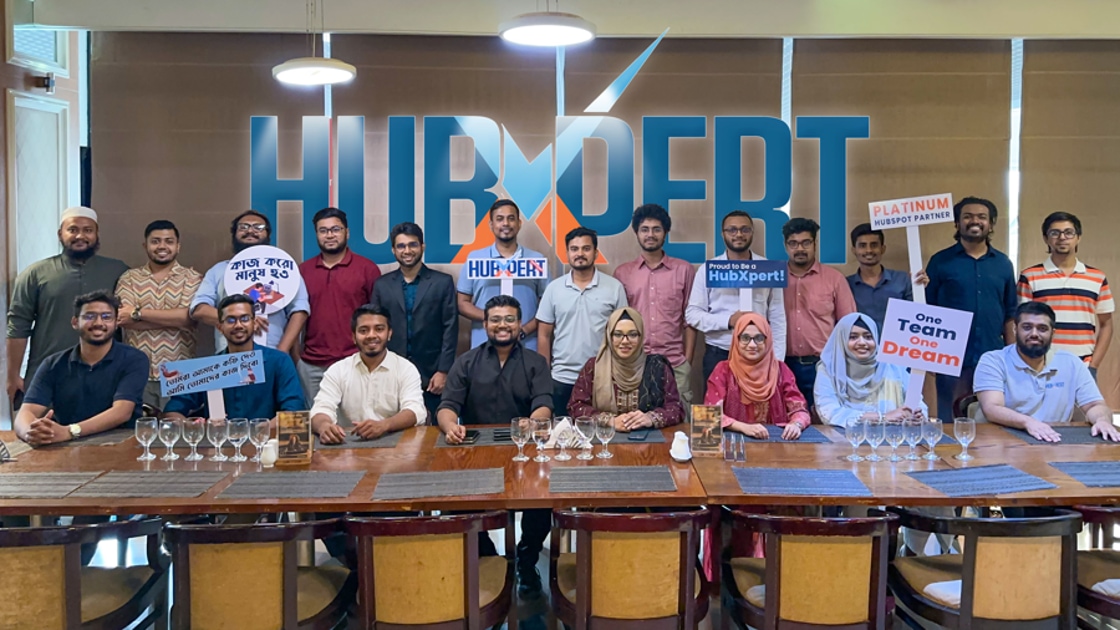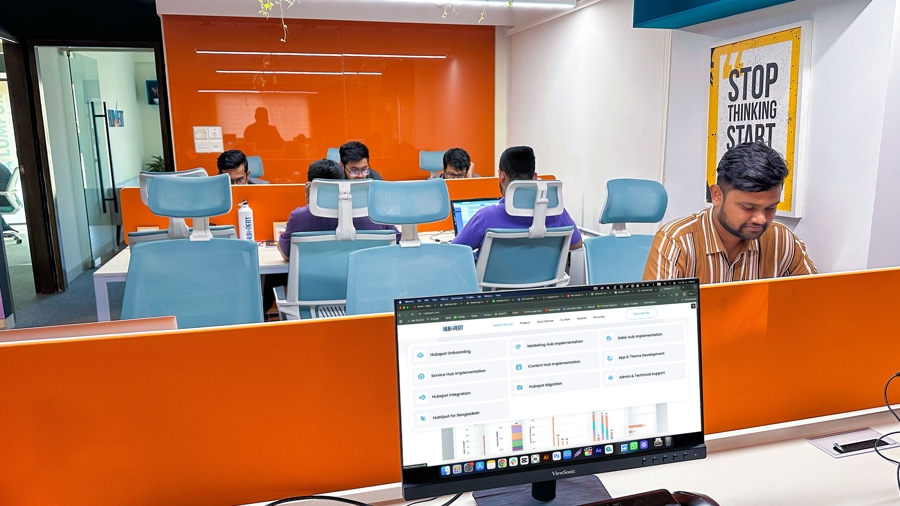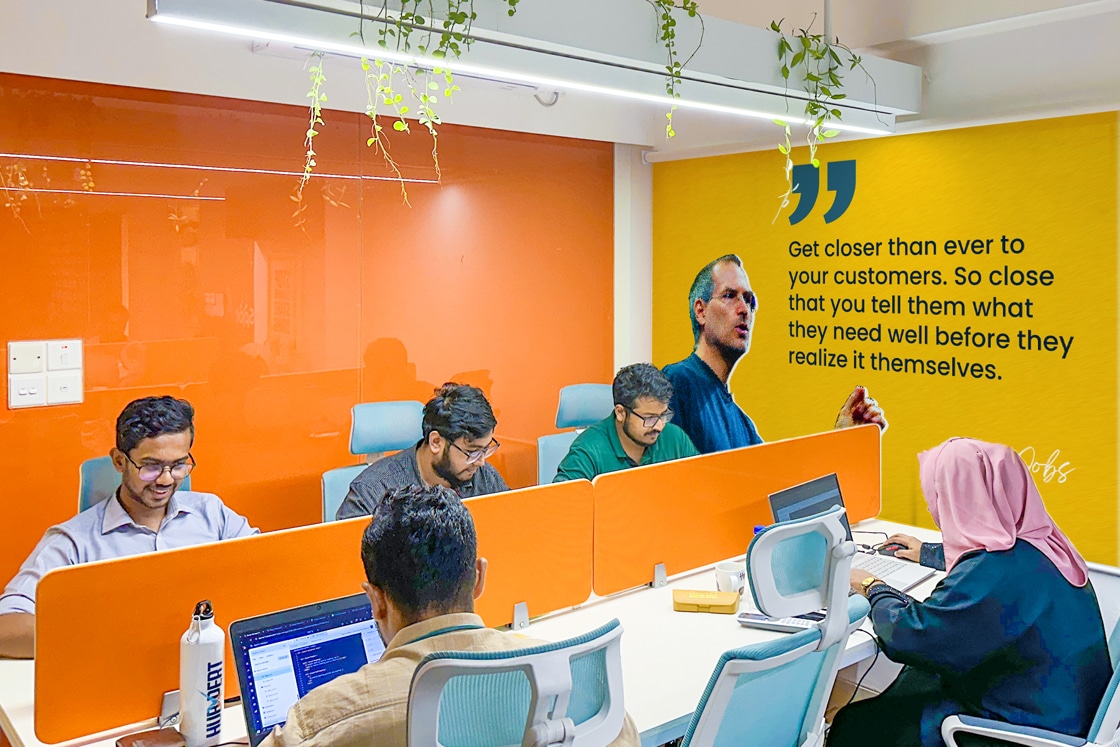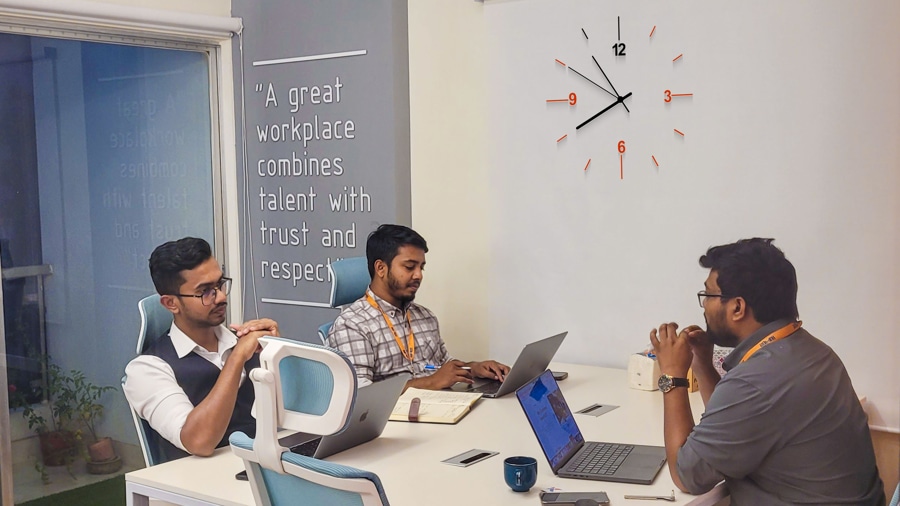
Most HubSpot partners take years to reach Platinum status. Hubxpert did it in seven months. The Dhaka-based company achieved something incredibly challenging: building a global software services business with 95% international clients, zero external capital, and a starting budget of just 10 lakh taka. In less than two years, the company has grown from a tiny office with four employees to a 26-person operation handling over 100 HubSpot implementations for clients across the globe and has carved out a niche in the hyper-competitive world of CRM solutions and digital transformation.
Software services companies are inherently hard to build well. The fundamental challenge is that success depends on several variables that are difficult to control: talent quality, talent retention, and service consistency.
Most service companies solve for one or two of these variables but struggle with the third. They might have great talent but can't keep them. Or they retain people but can't maintain quality as they scale. Or they achieve consistency but can't attract top performers.
The conventional wisdom says you solve this through better processes, higher pay, or more selective hiring. Hubxpert discovered something different: you solve it by making culture your primary business strategy, not an afterthought.
In an industry obsessed with technical prowess and proximity with clients, Hubxpert's founders bet on something quite old-fashioned: culture and relationships. The bet paid off in ways that challenge everything we think we know about building software businesses in emerging markets.
"Culture eats strategy for breakfast," Hubxpert founder and CEO Ratul Rahman often tells his team. It's not just a platitude, it's the operating system that powers everything from hiring decisions to client relationships.
As Somaiya Mowrin, Hubxpert's HR Lead, states, "From the very beginning, when we were a small team of only four people, that's when decisions were made about our culture".
With that, Hubxpert has cracked the code on three critical challenges that plague most service businesses: talent retention, quality consistency, and global market penetration.
Every impactful company has an origin story, and Hubxpert’s is deeply intertwined with the personal journey of its founder and CEO, Ratul Rahman. Ratul, a self-taught entrepreneur with a background in accounting from Dhaka University, embodies the spirit of perseverance.
His early life was shaped by significant hardships, including his father's accident in 2007, which led to years of medical struggles and financial crises for the family. These experiences instilled in Ratul a deep sense of responsibility and an unwavering ambition to rise above his circumstances. As he puts it, he didn't want his next generation to face the same struggles.
His journey into tech was organic, spurred by early exposure to coding during his intermediate years by a tutor who was a student of engineering. He spent countless hours learning online, building websites, and experimenting with code.
In 2017, during his second semester at Dhaka University, a senior became his mentor and offered him internships at two companies: a custom framing business, and a software firm.
The timing was perfect. Ratul balanced full-time work with his studies, a grueling schedule that proved invaluable. At that stage, he wore multiple hats—head of sales, marketing, and operations, playing a key role in growing from zero sales to a revenue of 4-5 crore taka annually.
The experience was transformative. Ratul immersed himself in sales, marketing, and operations, mastered a variety of marketing technologies like Facebook ads and Zapier through self-study and hands-on experimentation, and discovered his talent for building systems. More importantly, he learned that success requires more than individual effort, it demands team collaboration and shared purpose.
It was during this period, around 2019, that he first learned about HubSpot, finding it fascinating. When Shajao eventually shut down in 2021 due to funding issues, Ratul felt lost despite his extensive experience. A turning point came in 2022 when Alex, a Florida-based founder he had connected with years prior, offered him work implementing HubSpot solutions for his marketing firm, ScaleArmy. This period deepened Ratul's HubSpot expertise and validated the platform's potential.
However, working alone for Alex's Florida-based marketing firm provided financial stability but left him feeling unfulfilled. This period of depression helped him to understand what he actually wanted to build. Ratul recognized a deep-seated need for more than just financial stability; he craved purpose, risk, and the camaraderie of a team. He wanted to create a venture where people could do their best work together.
In April 2023, Ratul took the leap and founded Hubxpert. The name reflected his ambition: to become the go-to expert for HubSpot implementation globally. The company was born in a tiny office space with a handful of trusted colleagues, including Fazle Rabbi, who would become COO, and Rahman's wife, Somaiya Mowrin, who took charge of HR. The initial setup was informal, almost experimental.
"We focused on HubSpot implementation support to explore market demand," Rahman explains. "Despite pressure from the team to diversify into other areas, I maintained a strict focus on the HubSpot niche for the first six months."
That discipline proved crucial. By generating enough revenue to sustain itself, 2023 laid the groundwork for explosive growth.
Hubxpert's journey shows a fascinating story of how companies evolve and sophisticated strategic thinking behind every successful execution.
Ratul started with a critical decision: maintain laser focus on HubSpot for the first six months. Despite team pressure to diversify into general marketing or app development, he resisted. This niche focus proved crucial.
The team was small but carefully chosen. Fazle Rabbi (now COO) brought technical skills and learned HubSpot through Ratul's mentorship. Somaiya Mowrin (Ratul's wife) handled HR, understanding that culture would be their differentiator.
They operated from a tiny office space with an informal setup. The focus was experimentation—understanding market demand while building internal capabilities. Initial clients came through Ratul's relationship with Alex, cold outreach, and platforms like Upwork and LinkedIn.
By July 2023, they had hired two new team members. Revenue was sufficient to sustain operations. The foundation was set.
The beginning of 2024 marked a pivotal transformation. Hubxpert formalized its structure, creating three distinct service divisions:
"The clearer the roles and responsibilities, the better the company performs," Rahman believes. This organizational clarity became the foundation for its rapid ascent in HubSpot's partner ecosystem.
The HubSpot partnership pursuit began in early 2024. Within four to five months, the company achieved Gold Partner status. By November 2024, it became a Platinum Partner, a journey that typically takes years, completed in just seven months.
This rapid growth wasn't accidental. It reflected deep platform expertise and commitment to client success. HubSpot's recognition validated its approach.
The company's service portfolio expanded systematically. By mid-2024, it had developed its own app for the HubSpot marketplace, attracting over 100 installs and paid users. It developed themes and modules that sold successfully, creating recurring revenue streams.
Towards year-end, Hubxpert expanded into Odoo services and custom development, operating more like a full-fledged software company than a traditional agency.
The new year brought a new office, 2000 square feet compared to its original tiny space. The team had grown to 24 full-time employees plus 2 part-time contractors from the Philippines.
The numbers tell the story: over 100 HubSpot systems implemented, more than 10 apps developed, and a client base that's 95% international. For a company based in Bangladesh, this global reach is extraordinary.
This rapid growth wasn't accidental. It reflected the compound effects of Hubxpert’s culture-first approach, niche focus, and systematic quality processes. The company wasn't just completing projects, it was consistently delivering exceptional results that exceeded client expectations. HubSpot's recognition served as third-party validation of its expertise and quality, making it easier for the company to attract new clients and team members.

The beginning of 2024 marked Hubxpert's transformation from a scrappy tiny company to structured organization. Today, Hubxpert positions itself as a full-service HubSpot agency, but its offering is more sophisticated than typical service providers. The company has built what amounts to a "digital transformation stack" centered around HubSpot but extending into complementary areas.
HubSpot Implementation forms its core offering, integrating marketing, sales, and service teams into unified systems. The company helps businesses maximize ROI from premium software investments. The company handles every aspect of HubSpot implementation across all hubs:
Marketing Hub services include email marketing automation, lead nurturing campaigns, and social media integration. Service Hub automates service delivery and ticketing systems, customer support automation, and integrations with tools like Zendesk. Sales Hub manages entire sales systems, from tracking to lead management to pipeline optimization. Content Hub focuses on website and app development within the HubSpot ecosystem. Operations Hub streamlines business operations through data synchronization, data quality management, and workflow automation.
Migration Services moves clients from other CRMs to HubSpot while preserving data integrity and business continuity. Custom Development builds HubSpot apps and themes for the marketplace. Hubxpert’s app has over 100 installs and paying customers. Maintenance Services ensures dedicated 3-6 months of ongoing support, ensuring implementations deliver long-term value.
The company says 80% of its current revenue comes from HubSport implementation.
Beyond HubSpot, Hubxpert’s Digital Transformation Services vertical includes UI/UX design, Odoo implementation for more affordable ERP solutions, and cold email services for lead generation.
The genius of this structure lies in integration. Most agencies specialize in one area, forcing clients to work with multiple vendors. Hubxpert's three-team structure—RevOps, DevOps, and WebOps—enables seamless, end-to-end service delivery.
The company says its ideal customers are growth-focused companies with 10+ employees, funded startups, SaaS companies, B2B businesses, e-commerce platforms, and marketing agencies. Notably, 95% of its clients are international, with only 5% local, though it is actively pursuing more Bangladeshi projects.

What sets Hubxpert apart isn't its technical expertise, rather it's an almost obsessive focus on culture. From its early days, the company made a counterintuitive decision: it would hire for cultural fit first, technical skills second. This wasn't because technical skills didn't matter, but because it believed that motivated people with the right values would learn whatever technical skills were needed.
"We are intentionally built as a people-first, culture-first company," Rahman explains. This philosophy emerged from the founders' negative workplace experiences and their determination to create something different. We have written about Hubxpert’s culture at length here.
The hiring process reflected this philosophy. While technical assessment varied by role seniority, cultural fit had to meet the highest standard regardless of position. Candidates are screened for willingness to learn, patience, confidence, and respect. Warning signs included negative comments about previous employers—a simple heuristic that revealed a lot about how candidates approached challenges.
This approach required faith in human potential. Ratul brought on Fazle Rabbi, now COO, specifically because he had strong foundational skills and the right attitude, then trained him intensively on HubSpot. The investment paid off: Fazle became expert enough to train others, creating a multiplier effect.
Onboarding is treated as an art form. New hires receive welcome gifts, comprehensive handbooks, and structured introductions. Training modules are customized to individual learning paces, with a three-month grace period for mastering specialized technologies.
Compensation philosophy balances financial and non-financial motivation. Salaries often exceed market averages, with punctual payment, project bonuses, and performance rewards. A unique savings scheme encourages retention while providing financial safety nets.
Work-life integration receives serious attention. The company offers significant flexibility, including remote work options for employees with family responsibilities. The office environment includes unlimited snacks, coffee, recreational facilities, and regular social events.
But culture-first hiring was just the beginning. The real test was whether this approach would translate to business results.
Alongside the culture-first approach, Hubxpert made another crucial decision: it would focus exclusively on HubSpot for its first six months, despite team pressure to diversify into other services.
This decision was harder than it might seem. When you're a small company trying to grow, every potential revenue stream looks attractive. WordPress development, general marketing services, mobile app development—all seemed like logical extensions of your capabilities.
But Ratul understood something important about service businesses: depth trumps breadth in the early stages. By focusing exclusively on HubSpot, they could build genuine expertise rather than surface-level competence across multiple platforms.
This niche focus created several advantages. First, it allowed the company to develop deep knowledge of HubSpot's edge cases, integration challenges, and optimization opportunities. Second, it positioned Hubxpert as specialists rather than generalists, which commanded higher prices and attracted more serious clients. Third, it made the company’s marketing more focused and effective.
The niche strategy also reinforced its culture-first approach. Because HubSpot expertise was rare in Bangladesh, Hubxpert had to develop it internally. This created a learning culture where everyone was expected to become genuinely skilled, not just competent enough to get by.
As Hubxpert grew, the company developed what it called a "relationship-driven approach" to client service. This meant treating each client engagement as a long-term relationship rather than a transaction.
The practical implications were significant. Instead of trying to maximize revenue from each project, it focused on providing honest recommendations that genuinely benefited the client's business. The team would recommend against unnecessary services if they wouldn't add value. It under-promised and over-delivered consistently. If a client wasn't satisfied, it provided additional resources or issued refunds.
This approach seemed counterintuitive from a short-term revenue perspective, but it created powerful long-term advantages. Satisfied clients became advocates, generating referrals that were higher quality and easier to close than cold prospects. The relationship-driven approach also made its work more interesting and meaningful, which reinforced its culture-first philosophy.
Most importantly, this approach created a sustainable competitive advantage. Competitors could copy its technical processes or try to poach its team members, but they couldn't replicate the trust and reputation Hubxpert had built with its client base.
Culture and relationships were crucial, but they weren't sufficient. Hubxpert also needed systematic approaches to maintaining quality as the company scaled.
It developed strict Standard Operating Procedures for every aspect of service delivery. Each project got a dedicated Project Manager who was responsible for proactive client communication and ensuring deliverables met their standards. The company implemented a framework for HubSpot implementations that included discovery and goal setting, system design, phased implementation, training and support, and continuous optimization.
But the systematic approach went beyond processes. It also systematized its approach to talent development. New hires received welcome gifts, comprehensive handbooks, and structured introductions. Training modules were customized to individual learning paces, with up to three months for mastering HubSpot-specific skills.
Perhaps most importantly, the company systematized its approach to internal communication. Monthly one-on-ones with HR, team leads, and the CEO ensured that individual needs were heard and addressed. Monthly town halls recognized top performers and celebrated company-wide achievements.
This systematic approach to quality created predictable outcomes for clients while maintaining the human-centered culture that motivated its team.
One of Hubxpert's less obvious advantages was its geographic location. Operating from Dhaka provided two significant benefits that weren't immediately apparent to competitors.
First, its office hours of 2 PM to 10 PM aligned perfectly with US business hours. This meant international clients could assign work at the end of their day and wake up to completed deliverables. The productivity advantage was substantial and became a key selling point for US-based clients.
Second, its location provided cost advantages that they could pass on to clients without sacrificing quality. While it charged international rates, it could still provide competitive pricing compared to US-based agencies while maintaining healthy margins.
But the geographic advantage went beyond cost and timing. Being based in an emerging market forced the company to be more resourceful and systematic in its approach. It couldn't rely on abundant local talent or established industry networks, so it had to create its own systems for talent development and client acquisition.
This constraint became a strength. Its systematic approach to talent development and client relationships wasn't just good practice—it was necessary for survival. When it competed against established agencies in developed markets, its systematic approach often gave them an edge.

As Hubxpert established itself as a premier HubSpot services provider, it began developing its own products within the HubSpot ecosystem. Its app launched in the HubSpot marketplace and generated over 100 installs with paying customers. It also developed themes and modules that created recurring revenue streams.
This product development strategy was notable for how it complemented rather than competed with its services business. The products were based on patterns it had observed across multiple client implementations, so they were solving real problems that it understood deeply.
The products also served as marketing tools for its services business. Prospects could see tangible examples of its capabilities, which built trust and credibility. Team members could point to products they had helped build, which reinforced their sense of ownership and pride in their work.
By 2025, Hubxpert faced a new challenge: how to maintain its culture-first approach while expanding its service offerings and team size. It had grown to 24 full-time employees plus 2 part-time contractors, moved to a 2000-square-foot office, and expanded into Odoo implementation and custom development services.
The expansion created several tensions. Adding new service lines required developing expertise in areas beyond HubSpot, which challenged its niche focus. Growing the team made it harder to maintain the personal relationships that had been central to its culture. Serving more clients simultaneously tested its systematic approach to quality.
The company addressed these challenges by applying the same principles that had driven its initial success. New service lines were approached with the same depth-first strategy it had used for HubSpot. Team growth was managed through its systematic onboarding and training processes. Quality was maintained through its established SOPs and project management approaches.
But the expansion also revealed the scalability of its core approach. The culture-first philosophy, systematic quality processes, and relationship-driven client service weren't just tactics that worked at a small scale—they were principles that could guide decision-making as the company grew.
Looking at Hubxpert's success, it's tempting to focus on the obvious competitive advantages: technical expertise, geographic location, cost efficiency. But the real moat it has built is more subtle and more sustainable.
Its true competitive advantage is the systematic way it has solved the fundamental problems of service businesses: talent quality, retention, and consistency. Competitors can try to copy its technical processes or pricing strategies, but they can't easily replicate the culture and relationships that make those processes effective.
The culture-first approach creates a virtuous cycle. Happy employees do better work, which leads to satisfied clients, which generates referrals, which creates more interesting projects, which attracts better employees. Each element reinforces the others, making the whole system more resilient.
The systematic approach to quality creates predictable outcomes that clients can rely on. The relationship-driven approach builds trust that competitors can't easily undermine. Together, these create switching costs that go beyond simple price comparisons.
Hubxpert's ambitions extend far beyond its current success. Short-term goals for 2025 include achieving HubSpot Diamond Partner status, building dedicated teams across all verticals, and increasing their Bangladeshi market presence from 5% to 20%.
The company plans to invest heavily in brand building and explore establishing an international sales office. It's also expanding its Odoo partnership and venturing deeper into custom development and UI/UX design.
Long-term vision spans 5-10 years and includes building a global business with 80% of operations remaining in Bangladesh.
"We want to develop products from Bangladesh that meet international standards," Rahman explains. "The goal is to become a prominent software business that impacts the APAC region."

As Hubxpert pursues its ambitious goals, becoming a HubSpot Diamond Partner, further expanding internationally, and developing more products, it'll face the ultimate test of its approach.
The principles that got it to its current position will be tested by new challenges: managing a larger team, serving more diverse clients, competing in new markets, and developing capabilities in areas beyond its core expertise.
But its track record suggests it has the systematic approach needed to navigate these challenges. The culture-first philosophy provides a framework for making decisions about growth and expansion. The systematic approach to quality creates processes that can be adapted to new domains. The relationship-driven approach builds the trust needed to take on more complex and ambitious projects.
The real test will be whether it can maintain the human-centered culture that has been central to its success while building the systematic capabilities needed to compete globally. If it can, Hubxpert might become more than just a successful service company—it might become a model for how businesses in emerging markets can build globally competitive companies while staying true to their foundational principles.
Hubxpert’s story is still being written, but the lessons are already clear: culture can be strategy, relationships can be competitive advantages, and systematic approaches to talent development can create sustainable moats that are difficult for competitors to replicate.
